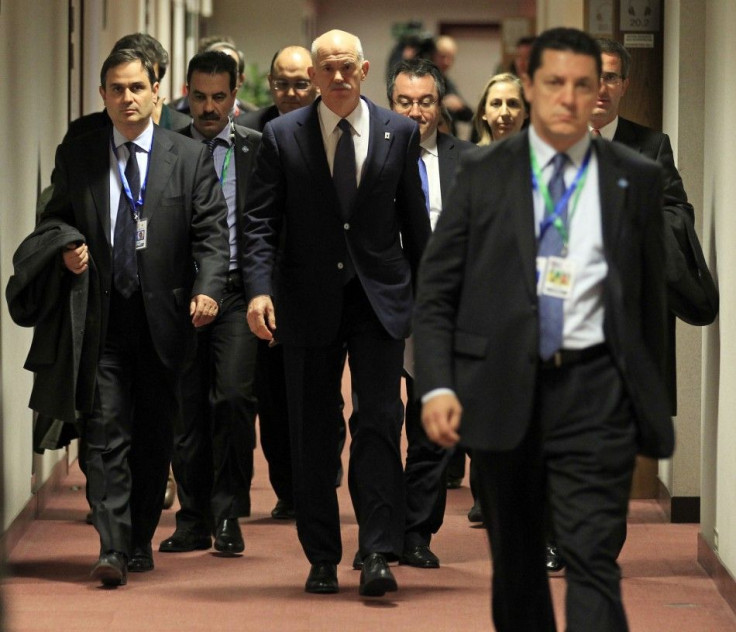European Leaders Agree to 50% Writedown on Greek Debt
European leaders asked bondholders to take 50 percent losses on Greek debt

European leaders agreed Thursday morning that banks and other major investors in Greek bonds must take losses of up to 50 percent to prevent a Greek government default.
The rescue fund is a response to global pressure to lower Greece's debt burden and attempt to contain the spreading debt contagion that threatens the euro zone.
The New York Times reported that the reduction would decrease Greece's debt to 120 percent of its gross domestic product from 150 percent. Though the figure is still quite large, it is more sustainable for an economy driven into recession by austerity measures, according to reports.
CNN reported that the difference will save the country an estimated €100 billion ($140 billion).
Under the deal, the bailout fund, the European Financial Stability Facility, will help the cash-strapped countries of Italy and Spain borrow up to a trillion dollars by providing some form of insurance that will make their bonds more attractive to potential investors.
Officials have also negotiated funding from the International Monetary Fund.
"The overarching goal of the exercise is to foster confidence in the European banking sector," said European Council president Herman Van Rompuy, according to CNN.
The European Union, 27-member organization, has said banks will be asked to raise about $150 billion in new capital as a cushion against any possible losses on their holdings of European government bonds that have dropped in value.
Concerns about the European economy have also drawn U.S. investors out of European banks and funds. Under the new plan, the European Central Bank, the European Investment Bank and other agencies have been asked to "urgently explore" a guarantee system so banks can stop relying mainly on short-term loans.
The exact amount banks will need to raise as a buffer against losses will be determined after declines in the value of euro zone government bonds are accounted for, which includes the debt issued by Greece.
Banks will have until the end of June 2012 to meet the new capital requirements, according to The Washington Post. Banks will have to first attempt to raise capital through restructuring or converting debit into equity. Government support is also a possibility and euro-zone governments that cannot support banks may be able to borrow money from the European Union bailout fund.
European Commission President Jose Manuel Barroso on Thursday said "Europe will do what it takes to safeguard financial stability," according to The Washington Post.
Germany reportedly took a tougher stance than France with the banks.
German Chancellor Angela Merkel has urged banks to first attempt to raise money in the private sector before turning to state assistance. Merkel was also reportedly willing to consider imposing an involuntary write-down on the private sector. But French President Nicolas Sarkozy was worried about the consequences on the markets and the banking system.
German lawmakers voted Wednesday to give Merkel the authority to negotiate an expansion in an emergency bailout fund to $1.4 trillion. This is more than double its current size of about $610 billion, according to The New York Times.
The German vote also proposed the use of money from the fund to issue new euro zone government bonds, according to CNN.
"The world is looking at Germany, whether we are strong enough to accept responsibility for the biggest crisis since World War II," Merkel said in an address to Parliament in Berlin, the Times reported. "It would be irresponsible not to assume the risk."
Lawmakers also voted on a new investment to attract capital to the EFSF from the private sector. According to CNN, China has also "expressed interest" in the special purpose investment vehicle.
Chinese interest in the European Union rescue effort slightly raised U.S. stock prices late Wednesday.
© Copyright IBTimes 2024. All rights reserved.











